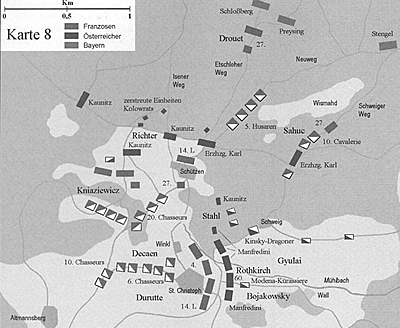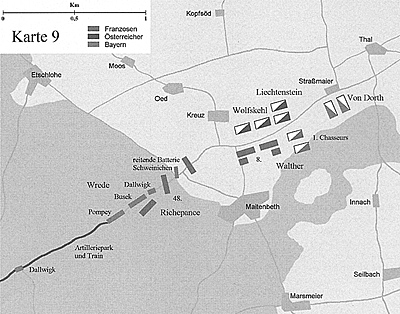Hohenlinden 1800:
The Forgotten Battle
The Aftermath
by Guenter Schneider, Germany
| |
After the battle the military force of Austria was broken. Only in Italy an army under Bellegarde was left, but in South Germany the way lay open to Austria and to Vienna. There was just a last try to resist Moreau and the French near Salzburg, but the retreat had to be continued. On 19 Decembre Archduke Charles overtook the command over the remains of the army from his younger brother John. One day later the French reached Linz and the river Enns on the 22nd. There were no more than 150 kilometres to the Austrian capital. At this moment Charles asked for an armistice, which was signed at Steyr on 25 Decembre. On 9 February 1801 the peace treaty was finally signed between Austria and France at Lunéville. One year later in March 1802 even Great Britain ended the war with France which had been lasting in the meantime for ten years. Bonaparte was now regarded as the pacificator of Europe, but he has always been jealous of Moreau, who had won the decisive battle. The Army of the Rhine and its commanders had to endure his jealousy. After the peace treaty the army was dissolved, but most of its commanders were not supposed to continue a great military career in the future. Michel Ney became the most famous among them. Not before 1815 Grouchy became marshal as well, only to serve as a scapegoat for the disaster at Waterloo. Lahorie the chief of staff of the 2nd corps was shot in 18 12 because he was tangled in the affair of General Mallet. Lecourbe the commander of the 1st corps fell in to disgrace during the trial against Moreau in 1804. He did not return into active service un til 1814 under the Bourbons. The campaign in Germany with the Army of the Rhine was the last military action of Sainte-Suzanne, the commander of the 4th corps. In 1804 he left service at the age of forty-four. Desperrières as well was dismissed in 1804 and finally returned into active service under the Bourbons.
And what happened to Moreau? It was no secret that he did not estimate Bonaparte. His mistake was to show it and to stay in contact with other opponents to the government. He even stayed in contact with Pichegru who in 1804 got caught in the conspiracy of Cadoudal against the First Consul Bonaparte. During this affair Moreau was arrested as well, but he was acquitted by the court. Bonaparte changed this decision and Moreau should be imprisoned for two years. Finally he was pardoned but he had to leave France forever. Moreau decided to go to the United States, where he lived in Morrisville near Philadelphia. In 1813 Tsar Alexander invited him to return to Europe and to participate as a military adviser in the campaign in Saxony. Moreau followed the call against his old comrades in arms, he reached the allied army in Bohemia in August and participated in the battle of Dresden, where he was wounded by a cannonball which smashed his legs. One week later Moreau died of his wounds on 2 September 1813. Hohenlinden 1800 The Forgotten Battle
The Campaign in South Germany The Commanders of the French and Austrian Armies The Hostilities Re-Open Battle of Hohenlinden The Aftermath French Army of the Rhine Austro-Bavarian Army Back to Table of Contents -- First Empire #64 Back to First Empire List of Issues Back to MagWeb Master Magazine List © Copyright 2002 by First Empire. This article appears in MagWeb (Magazine Web) on the Internet World Wide Web. Other military history articles and gaming articles are available at http://www.magweb.com |


 Even Dessolle the chief of staff of the Army of the Rhine fell into
disgrace because of his friendship with Moreau. He stayed away from service up to
1808 and in 1818 he became the minister of foreign affairs. Others were sent to the
colonies as for example Richepance, the hero of Hohenlinden. In 1802 he became
the commander of the expedition corps to Guadelou pe where he died of yellow fever
in the same year. Decaen went to India in 1803 not to return before 1810 when
Mauritius surrendered to the British.
Even Dessolle the chief of staff of the Army of the Rhine fell into
disgrace because of his friendship with Moreau. He stayed away from service up to
1808 and in 1818 he became the minister of foreign affairs. Others were sent to the
colonies as for example Richepance, the hero of Hohenlinden. In 1802 he became
the commander of the expedition corps to Guadelou pe where he died of yellow fever
in the same year. Decaen went to India in 1803 not to return before 1810 when
Mauritius surrendered to the British.